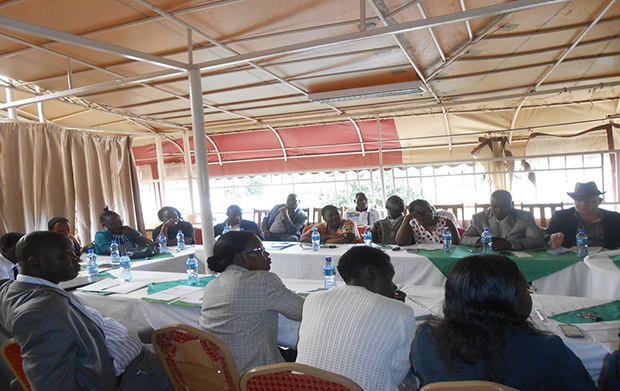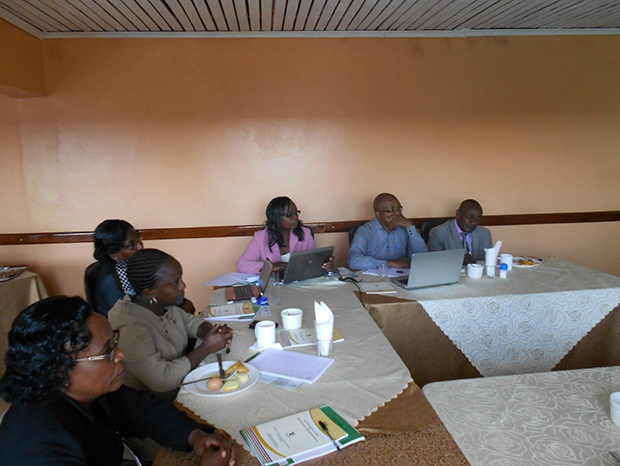
Family Planning Champions in Kenya Celebrate Success in Counties
(July 2015) Policymakers in Kenya’s Embu and Bungoma counties recently showed their support for family planning by approving firm budget commitments in the 2016 fiscal year. Their actions marked success for Population Reference Bureau (PRB)’s work with a local partner on bolstering family planning policies in the country.

Policymakers in Bungoma County, Kenya participate in a high-level meeting on family planning.
Elections in 2013 marked the official launch of Kenya’s devolution into a 47-county system that tasked new county governors and assemblies with governance, financial management, and other functions. PRB, through the IDEA project, has been working with the National Council for Population and Development (NCPD) in Kenya on targeted family planning advocacy that capitalizes on the country’s new decentralized political structure. The goal: Include family planning in county budgets. Embu and Bungoma were chosen as two priority counties under IDEA.
Devolution Requires Customizing Family Planning Advocacy Strategies
Devolution offers an opportunity for county leaders to translate national commitments into policy and program changes at the subnational level in ways that meet the needs of their particular county. Family planning is recognized as a priority investment by the national government in Kenya, but advocacy is now required at the subnational level to build relationships with new stakeholders.
Under IDEA, strategies to increase support for and commitment to family planning at the county level included:
- Communicating evidence and information about the role of family planning in achieving health and development objectives.
- Nurturing family planning champions through capacity-building workshops.
- Establishing and supporting communities of policy experts and multisectoral leaders.
- Focusing attention on family planning through one-on-one meetings with county decisionmakers and high-level policy dialogues.
County-Level Advocacy Means Expanding Relationships
NCPD’s county population coordinators (CPC) from priority counties identified local champions who support family planning and have influence over decisionmakers. NCPD staff and their teams of champions attended an IDEA-led policy communication workshop, where they strengthened skills, learned about the county budgeting process, and developed county-specific advocacy plans.

Representatives from the Embu County Health Executive and County Health Management Team share breakfast and discuss need for financial commitment to family planning in Embu.
Outcomes in Bungoma and Embu counties show that targeting the right decisionmakers from the beginning of the activity is central to success. Potential key decisionmakers included county executives in health, finance and planning, gender and youth, as well as members of county health and budget committees, and the county health management team. The county advocacy teams held a series of one-on-one meetings with decisionmakers and organized high-level policy dialogues on family planning. Enoch Obuolo, the CPC based in Kakamega, Kenya, led the advocacy effort in Bungoma County. For Obuolo, the challenge of understanding the “political dynamics”—knowing the roles of the key stakeholders and with whom to begin the conversation—was critical. His experience taught him to start with the health management teams, the directors or chief officers of health, and the health committees, because they are the initiators of the budget. Obuolo had to work hard to convince several leaders who were initially opposed or less concerned about family planning issues. He noted that “Some even had to take the KLTW [“Kenya Leading the Way” ENGAGE multimedia presentation] video to watch alone at home or in their offices and came back to report changed positive attitudes toward family planning.”1
Beatrice Okundi, the CPC in Embu County, felt that her most important job was to let county leaders know that family planning was a county-level issue. She had to build new relationships so she could create awareness about the status of family planning in Embu and provide relevant data, such as the contraceptive prevalence rate and the total fertility rate. Okundi used these new relationships to develop “buy-in to the idea of creating a budget line for family planning.”2
Localizing Messages Is Important
According to Obuolo, the advocacy teams had to dispel the myth that family planning was not a priority at the county level because it was already heavily supported by global development partners. He felt that the “need to aim for self-sustainability on family planning” was one of the most important messages to promote: Counties need to make their own plans for family planning programming and service delivery. Obuolo ensured that the local message reached intended audiences, “I made sure I involved the media, especially after PRB’s training…Because of this increased awareness, the media invited the county population coordinator to one of the region’s FM station[s] to discuss and educate the public about family planning.”
Shelley Megquier, policy analyst at PRB and the point person for IDEA on this effort, echoed the point that local messaging was extremely important. According to Megquier, the approach of each advocacy team took a different shape in each county and “CPCs strategically chose specific arguments in support of family planning based on the cultural context of their county and the county’s health indicators.”
Family Planning Line Item Represents Advocacy Success
High-level officials in both Embu and Bungoma have indicated that there is a family planning line item in their 2016 program budgets. In Embu, due to the efforts of Okundi and her team of champions, the family planning line item doubled from an initial allocation of 750,000 Kenyan shillings to 1.5 million Kenyan shillings (approximately US$15,000), and in Bungoma, advocates reported the family planning line item was almost as high at 1.2 million Kenyan shillings. Now that family planning line items have been established within these county budgets, the next step will be to leverage these commitments in order to secure additional funds to meet family planning needs.
One challenge for advocacy teams is education for decisionmakers that family planning budgeting should include a package of goods, services, and activities including training of health workers, transportation, health infrastructure—not just the contraceptive commodity itself. Challenges lie ahead, particularly regarding unanswered questions about commodity procurement responsibilities as the decentralization process continues. In Embu, health clinics are already facing supply issues. Okundi noted that two health sector champions on her team were also involved in making sure that commodities were sent to towns and villages when they reported shortages.
Both Okundi and Obuolo reported challenges they had to overcome, including competing demands for budget resource allocation, personnel transitions within county governments, and difficulty securing meetings with key decisionmakers. Both also spoke of the technical and moral support that NCPD and PRB provided as invaluable, especially the value of the policy communication training. They concurred on the need to recruit more champions to help with the advocacy process. Two immediate next steps for the 2017 fiscal year will be to build on accomplishments in Embu and Bungoma so that more counties set aside funds for family planning and for existing financial commitments to family planning to be increased.
References
- PRB interview with Enoch Obulo, National Council for Population and Development (NCPD) County Population Coordinator, Bungoma County, Kenya, June 16, 2015.
- PRB interview with Beatrice Okundi, National Council for Population and Development (NCPD) County Population Coordinator, Embu County, Kenya, June 16, 2015.
